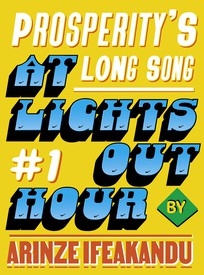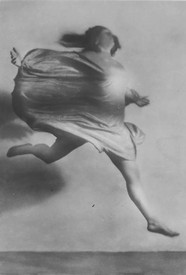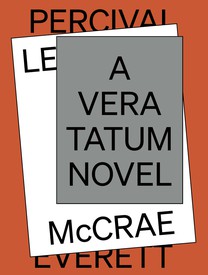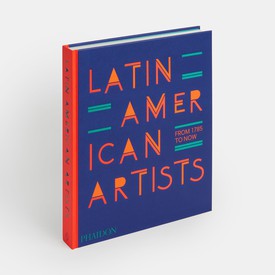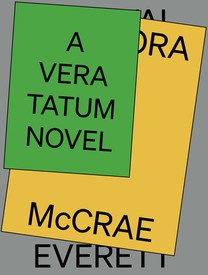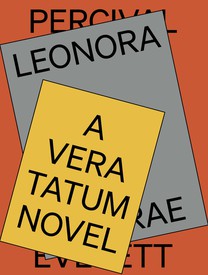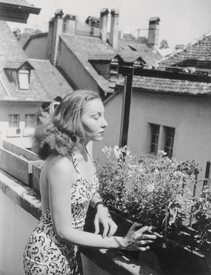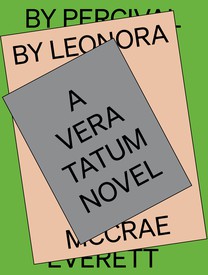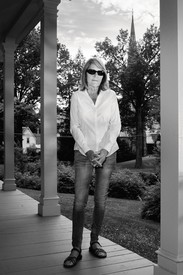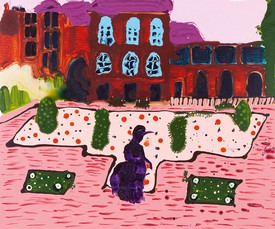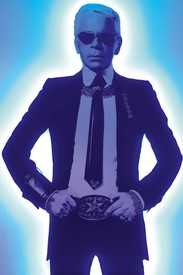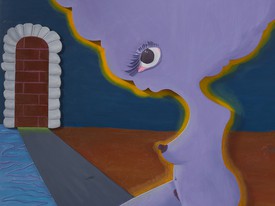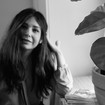
The poet and essayist Anne Boyer is the inaugural winner of the Cy Twombly Award for Poetry, from the Foundation for Contemporary Arts, and a 2018 Whiting Award winner. Her latest book, The Undying (2019), won the 2020 Pulitzer Prize in General Nonfiction.
The sacraments of the newly converted were performed in the torrential summer rains, but the sacraments of my counter-religion were performed once every twenty-four hours, at nightfall, after I’d pressed the keycard against my hotel-room door. I’d turn on all the lights, charge my devices, call room service for a steak and French fries, watch HBO with the volume full blast, look at the Internet, sign for my meal with a 30 percent tip and eat only half of what came to me, unscrew the caps of all the toiletries, fill the bathtub with hot water, empty it, fill it again, wash the streets and crowds and conversions off me, drench myself in lotion from tiny plastic bottles, throw all the towels on the floor, call the front desk for more lotion, climb into the Egyptian-cotton sheets and take a selfie there.
Some people act out of principle but the rest of us are easier to understand. I had $57,043 in art-school debt, a $5,189 balance on my Discover card, $213 in my checking account, a $20 Apple Music gift card, and $43 and a jarful of coins in cash. My mother lived with my aunt and cousins in a three-bedroom townhouse after losing my childhood home to Hurricane Brittany and losing my father to a polyamorous project manager he met at CrossFit. My older brother had disappeared in late 2020, along with his life savings, into a neoorthodox, purpose-driven cloister, and I only ever heard from him once a year when he forwarded a mass email about the war on Christmas.
It was spring when I stayed up late filling out the application for the job that got me here, clicking sane-enough-sounding answers on the psychological screening, signing the releases and privacy agreement, and offering up my writing samples, biometrics, social media passwords, and phone and laptop log-in information to an unspecified entity represented, upon reception of the application materials, by a slender, ponytailed woman in athleisure pants. She met me at a coffee shop, ordered an absinthe flavored green tea with a spirulina shot, said I seemed like a self-starting team-player, and promised me a job that could change the world.
I should think of it as a performance, she said—a content provider crossed with a spy!—parting her plumped lips and laughing. I was to be myself, but different, should pretend to be myself as if I were someone radicalized by the era’s movements, enlightened and hungry. “Do you know people like that?” she asked, not pausing for an answer.
What I was to get in exchange for being myself, but different, she said, was a paycheck that would cover my student loans and health insurance and give me some money to spare. I had been given, too, the promise that if I successfully did what I was asked, I’d receive a bonus substantial enough to buy a cute-enough house and adopt a sweet-but-troubled rescue dog and an easy life somewhere safe from the future, some place like Minnesota where the coasts could not flood and the fires would not burn.
I said yes, of course, after lingering over the contract long enough to suggest I had read it. The ponytailed woman laughed again, her face barely creasing where in another era a wrinkle might have appeared. Her ponytail, as she walked away, was the only worried thing about her. Her face was professionally unbothered but her hair quivered with concern.
She had instructed me to spend time among the converts on the streets, so that’s what I did between nights in that bed. I had packed up my journals, clothes, books, and small kitchen appliances and surrendered them to a storage locker. I sat my housemates down and explained that I couldn’t help but join the believers in the streets. My housemates rolled their eyes, tried to dissuade me, then cried. I told them they would join me soon enough. I texted my mother and posted a photo of myself among the faithful in the park.
Each day I would pretend to be one of the faithful, then back in the hotel room I’d pretend not to think of them or of the way I was using them, try to amuse myself with a vivid fiction about my employer, the one whose name I was never told. I’d convinced myself it must be a billionaire, probably a famously vindictive, sea-steading neofascist for whom any slight was not slight enough to overlook on the schedule of vengeance. I was working, I hoped, for the kind of money-grubber who could, with a hand gesture, destroy empires. It comforted me to think I was working for someone like that, the kind of person about whom you could watch a Netflix documentary narrated in conspiratorial and crypto-admiring tones. It comforted me to think of myself as an agent in a primitive and visceral personal revenge plot with payrolls and go-betweens and geo-trackers. It comforted me in the way one might be comforted by peeling off a scab, or pulling out a hair, or cutting into one’s own skin with a blade in order to feel.
I would meet the eyes of the dubious hotel employees as I entered the threshold of evening, trying to hide any sign that I had been among the believers in the open air. But they knew I wasn’t up to good and I knew it too. Any suggestion that the job I’d accepted was about saving the world was nonsense, but I could at least find comfort in feeling that revenge was a plausible motivation. This seemed like a simple case of it, and I could understand revenge. I wanted revenge, too.
I had a long list of targets, which I would also think of each night in that hotel room, and on it were pretty much half the people I’d ever met and many whom I hadn’t. I wanted revenge against my ex-girlfriend, against all the guys I’d hooked up with only to be disappointed again and again in the lack of pleasure available in the act of pleasure, against the seventh-grade teacher who gave me a C- in English, against the insurance company that wouldn’t pay to rebuild my mother’s home, against the art school that had indebted me by promising me that my education would improve my life when instead it just sensitized me to its miseries. I wanted revenge against the people who had given me what they called “opportunities” that ended up being opportunities to work for nothing wages, increasingly broke, too tired at the end of any day to undertake the great system of self-discipline that everyone told me was necessary to overcome being tired. I wanted revenge that I was too tired to eat right, too tired to work out, too tired to get things done, too tired to do anything but read the productivity listicles, the recipes for hacking into the form of rightness in this whole world of wrong, too tired, even, to love, which only took the form of cloying sexual need and emotional desperation, soon to lead to disappointment and despair, not just for me but for everyone. Those who were coupled up were in ragingly needy pairs, their wounds now symbiotic, posting obnoxious photos online together, treating each other horribly but afraid to leave. I wanted revenge for how vapid all love was, how degraded sexual pleasure was too.
I wanted revenge, but the person or people responsible for the misery in my life couldn’t be tracked down. If you tried to make a documentary exposing my enemies, no one would be on-screen, or else what was on-screen would be everything, a screen so crowded with the world you wouldn’t be able to make out the world at all.
If I asked a stranger who was responsible for my misery, I knew what answer they’d have. And if you asked me who was responsible for my misery, even I would probably identify that person, too: it was me, we would all say. Me is the enemy we are all supposed to share. Like anyone else, I could enumerate my own defects, bad decisions, and ethical inadequacies, like the one about how I didn’t care enough about anything to refuse this job, to refuse this money, to question what it was all about, or the one where when I felt the stirring of desire for meaning I got sick about it and ran away. If you asked me who was responsible for my own misery, I’d blame myself with good reason and blame my own heart, which I believed was full of nothing but fleeting sensations and the hatred I then felt for this world.
Or if you asked anyone else who was responsible for my misery and if this anyone else claimed to be politically enlightened, they might say some version of the system was to blame. I thought of these people, too, as I rested in the hotel’s clean sheets in the bed perfected by the exhausted cleaning ladies, my stomach swollen from the room service that the sad young men brought me from the kitchen where the sad old men cooked it. The enlightened would name the source of my unhappiness the system, meaning the mechanical and godlike methods of capitalism and its weapons of execution that are necessities of survival, the greatest weapon of all being the ability to make all existence feel like the loneliest thing in the world. It’s not that they were wrong. But the problem with those people, the problem with blaming the system, call it capitalism or whatever else, call it anything else, call it fate or history or the illuminati, call it bullshit, even, was that the word system confirmed a kind of irrevocability of the world. Pretty much all the system could do was break down, and us along with it. To call what made me miserable the system was pretty much to call it eternity. That’s what it felt like even in these hotel nights, and this, too, is why I blamed myself. I blamed myself that I couldn’t even accept the heartfelt explanations offered by well-meaning housemates and college friends, the ones who spoke of bringing it down or setting it on fire all the while unconsciously doing everything they could to stabilize and sustain the same system that they were thrilled to hate.
I’d spent so much of my life agreeing with the world that I was responsible for my life’s disappointing course that in those days I found in this fiction of agency the perfect place to exact revenge against the world. If I believed the problem was me, I could live with knowing that nothing mattered, that nothing meant anything, and in this I could enact revenge against the source of all misery, myself, for once having desires at all, for once having imagination, for sometimes wanting life to mean something, anything, for sometimes even hoping, or at least hoping for something beyond money and safety and comfort, something even beyond the stupid lie of love. I hated all this about myself and wanted to kill it. I hated all the soft things that made up my person, the ones that remained vulnerable to the storm of the world, and so it was that the revenge I desired so fervidly was always against me, and never against the world, unless it could be said that my revenge against the world was withholding any concern for it, withholding any faith in it or its capacity to change.
When people asked me later how I felt about my deception, my answer would be that how I felt was that I tried not to feel. I tried to only feel the sensation of the hotel-room nights between the working days, tried to enjoy my steak or my extravagant bath or the voluptuousness of making a mess for the workers to clean, tried not to think about what was wrong or right, what was logical or nonsensical, what was a good or bad idea. Ideas were merely dust particles in the sun compared to the noisy and metallic and costly things that circulated and whirred and weighed the world down, the things that poisoned and cured and killed and sedated. The powerful needed no ideas, and, as far as I could tell, needed no protection from them either. Power itself was not an idea, or not much of one. It was a word that meant having the greatest accumulation of things possible, the things people needed to make other things, the things that could hurt people if withheld, or that could hurt people, too, when deployed. When power took human form, that form was more often than not the form of a servant, a person who had been made into a thing, an instrument for power’s uses. The woman with the ponytail and the toned upper arms, the one who carefully delivered my instructions, was an instrument of power, and her servitude to it was signaled in every aspect of her person, from her anxious hair to her pedicured feet.
This job wouldn’t save the world, and neither could the believers in the streets. The powerful were the ones who could change things, but they were also the ones with the most at stake in keeping everything the same. Everyone who knew anything said there was no future, and this is what all the new believers on the street said too, but I couldn’t understand. How could there be no future if each day I found myself waking up into one? Every minute I lived was followed by a future minute that was, if I were to believe what everyone said, impossible. Every minute, every worry, every care and unpaid bill I had carried forward with me accumulated into even more future, a tedious and difficult one that hurt to enter.
It wasn’t that there was no future. The problem was that there was too much of one. Everything seemed to want to make that overwhelming and giant future ahead a grimmer version of the past, a heavier, more difficult version of being alive, so that anyone who lived in the present would dread the future, would regret its coming, would pray for it never to crash upon the present, wrecking in its infiltration all possible joy and torturing all possible meaning out of the minutes as they passed. It was as if we were not to think of the future as anything but a present made so terrible that we would have to avert our eyes from all tomorrows.
All these, too, however, were merely ideas, and so were finally of little consequence. I was sorry that I had them. That there was even a group of people called “the powerful” was merely an idea, and a childish one at that. As you must surely understand by now, in those times, and even for many of the days after, the powerful were only ever real to me as far as their pale cold fingers reached into my bank account and put money in it and took money out.
Read “The Iconoclasts: Part 1,” “The Iconoclasts: Part 3,” and “The Iconoclasts: Part 4”
